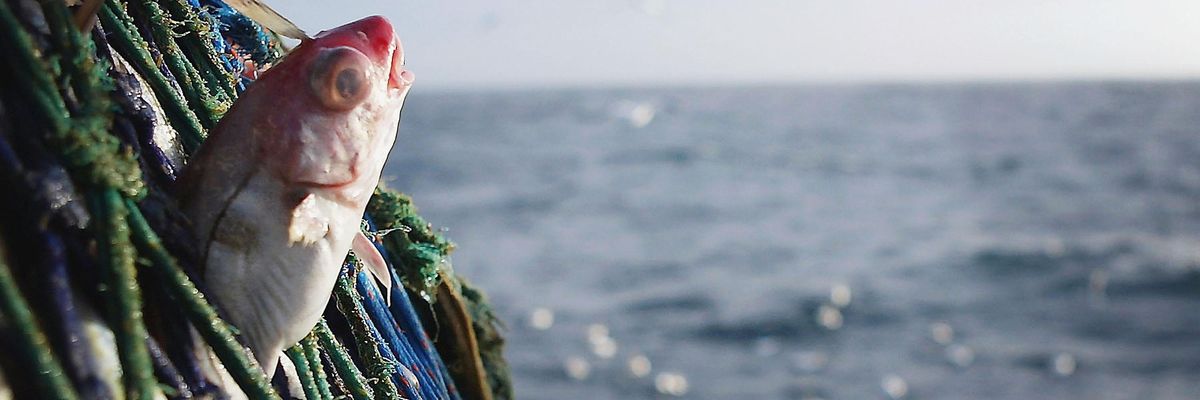
A Haddock caught in the nets of the trawling net in The North Atlantic. Nearly 1,000 fishermen, business leaders, scientists, and organizations fighting for the health of our oceans called on U.S. House lawmakers to reject H.R. 200. They did not listen. (Photo by Chris Furlong/Getty Images)
GOP-Controlled House Passes Bill to Eviscerate Nation's Marine Ecosystems, Fisheries
If the bill becomes law, it "would reverse decades of bipartisan progress towards preventing overfishing and rebuilding fish populations, harming the health of our marine ecosystems and the coastal communities who depend on them."
Conservations, scientists, and members of fishing communities and industry expressed outrage and disappointment after the U.S. House of Representatives passed a bill on Wednesday that experts warn will set the nation's fishing industry back decades by eviscerating protections that have made U.S. fisheries more sustainable and undermining the health of marine ecosystems as well as the communities that live off the ocean.
With a final vote of 222 to 193, the bill known as H.R. 200--officially titled the Strengthening Fishing Communities and Increasing Flexibility in Fisheries Management Act--was passed along party lines, with just nine Democrats voting in favor and just 15 Republicans voting against. See the full rollcall vote here.
"Recovering depleted fisheries under H.R. 200 would be like fishing for sardines with a whale-sized hole in the net."
--Martin Hayden, EarthJustice
The problem with the legislation, say people like Martin Hayden, vice president for policy and legislation at Earthjustice, is that the bill does the very opposite of what its name suggests.
"Recovering depleted fisheries under H.R. 200 would be like fishing for sardines with a whale-sized hole in the net," Hayden warned. If the bill becomes law, he added, it "would reverse decades of bipartisan progress towards preventing overfishing and rebuilding fish populations, harming the health of our marine ecosystems and the coastal communities who depend on them."
The GOP-controlled House passed the bill despite letters (pdf) of opposition from over 500 U.S. businesses and individuals, including 14 restaurant and seafood companies, 12 aquariums, over 350 chefs, 200 scientists, over 50 dive shops, and multiple recreational fishing groups.
\u201cToday, the House passed H.R. 200, a bill which would undermine US fisheries management and reverse progress, and would be damaging for seabirds like Atlantic Puffins. Audubon urges the Senate to reject this bill. #KeepOceansFishy https://t.co/il2mLeQ0Yc\u201d— Audubon Society (@Audubon Society) 1531353617
Rather than "strengthening" the existing law known as the Magnuson-Stevens Act (MSA), which governs much of the ways in which the nation's fisheries are managed, opponents warn that H.R. 200 is designed to gut the hard-won progress and marine life protections achieved by conservationists and fishing communities since the mid-1970s.
"In the last 40 years," said Whitney Webber, campaign director for the conservation group Oceana, following Wednesday's vote, "the Magnuson-Stevens Act has helped the United States become a global leader in fisheries management. Yet, with today's vote, Congress has allowed special interests to trump science, leaving future generations of fishermen, seafood consumers and ocean enthusiasts to pay the price."
The MSA, she added, "has succeeded in reversing overfishing and bringing back fisheries abundance in the U.S. However, H.R. 200 would undo the significant progress we've made over the past several decades for the health of America's fisheries and fishermen. This bill would weaken science-based conservation of U.S. fish populations, decrease accountability, and increase the risk of overfishing by removing annual catch limits for many species."
The bill now heads to the U.S. Senate for a vote.
An Urgent Message From Our Co-Founder
Dear Common Dreams reader, The U.S. is on a fast track to authoritarianism like nothing I've ever seen. Meanwhile, corporate news outlets are utterly capitulating to Trump, twisting their coverage to avoid drawing his ire while lining up to stuff cash in his pockets. That's why I believe that Common Dreams is doing the best and most consequential reporting that we've ever done. Our small but mighty team is a progressive reporting powerhouse, covering the news every day that the corporate media never will. Our mission has always been simple: To inform. To inspire. And to ignite change for the common good. Now here's the key piece that I want all our readers to understand: None of this would be possible without your financial support. That's not just some fundraising cliche. It's the absolute and literal truth. We don't accept corporate advertising and never will. We don't have a paywall because we don't think people should be blocked from critical news based on their ability to pay. Everything we do is funded by the donations of readers like you. Will you donate now to help power the nonprofit, independent reporting of Common Dreams? Thank you for being a vital member of our community. Together, we can keep independent journalism alive when it’s needed most. - Craig Brown, Co-founder |
Conservations, scientists, and members of fishing communities and industry expressed outrage and disappointment after the U.S. House of Representatives passed a bill on Wednesday that experts warn will set the nation's fishing industry back decades by eviscerating protections that have made U.S. fisheries more sustainable and undermining the health of marine ecosystems as well as the communities that live off the ocean.
With a final vote of 222 to 193, the bill known as H.R. 200--officially titled the Strengthening Fishing Communities and Increasing Flexibility in Fisheries Management Act--was passed along party lines, with just nine Democrats voting in favor and just 15 Republicans voting against. See the full rollcall vote here.
"Recovering depleted fisheries under H.R. 200 would be like fishing for sardines with a whale-sized hole in the net."
--Martin Hayden, EarthJustice
The problem with the legislation, say people like Martin Hayden, vice president for policy and legislation at Earthjustice, is that the bill does the very opposite of what its name suggests.
"Recovering depleted fisheries under H.R. 200 would be like fishing for sardines with a whale-sized hole in the net," Hayden warned. If the bill becomes law, he added, it "would reverse decades of bipartisan progress towards preventing overfishing and rebuilding fish populations, harming the health of our marine ecosystems and the coastal communities who depend on them."
The GOP-controlled House passed the bill despite letters (pdf) of opposition from over 500 U.S. businesses and individuals, including 14 restaurant and seafood companies, 12 aquariums, over 350 chefs, 200 scientists, over 50 dive shops, and multiple recreational fishing groups.
\u201cToday, the House passed H.R. 200, a bill which would undermine US fisheries management and reverse progress, and would be damaging for seabirds like Atlantic Puffins. Audubon urges the Senate to reject this bill. #KeepOceansFishy https://t.co/il2mLeQ0Yc\u201d— Audubon Society (@Audubon Society) 1531353617
Rather than "strengthening" the existing law known as the Magnuson-Stevens Act (MSA), which governs much of the ways in which the nation's fisheries are managed, opponents warn that H.R. 200 is designed to gut the hard-won progress and marine life protections achieved by conservationists and fishing communities since the mid-1970s.
"In the last 40 years," said Whitney Webber, campaign director for the conservation group Oceana, following Wednesday's vote, "the Magnuson-Stevens Act has helped the United States become a global leader in fisheries management. Yet, with today's vote, Congress has allowed special interests to trump science, leaving future generations of fishermen, seafood consumers and ocean enthusiasts to pay the price."
The MSA, she added, "has succeeded in reversing overfishing and bringing back fisheries abundance in the U.S. However, H.R. 200 would undo the significant progress we've made over the past several decades for the health of America's fisheries and fishermen. This bill would weaken science-based conservation of U.S. fish populations, decrease accountability, and increase the risk of overfishing by removing annual catch limits for many species."
The bill now heads to the U.S. Senate for a vote.
Conservations, scientists, and members of fishing communities and industry expressed outrage and disappointment after the U.S. House of Representatives passed a bill on Wednesday that experts warn will set the nation's fishing industry back decades by eviscerating protections that have made U.S. fisheries more sustainable and undermining the health of marine ecosystems as well as the communities that live off the ocean.
With a final vote of 222 to 193, the bill known as H.R. 200--officially titled the Strengthening Fishing Communities and Increasing Flexibility in Fisheries Management Act--was passed along party lines, with just nine Democrats voting in favor and just 15 Republicans voting against. See the full rollcall vote here.
"Recovering depleted fisheries under H.R. 200 would be like fishing for sardines with a whale-sized hole in the net."
--Martin Hayden, EarthJustice
The problem with the legislation, say people like Martin Hayden, vice president for policy and legislation at Earthjustice, is that the bill does the very opposite of what its name suggests.
"Recovering depleted fisheries under H.R. 200 would be like fishing for sardines with a whale-sized hole in the net," Hayden warned. If the bill becomes law, he added, it "would reverse decades of bipartisan progress towards preventing overfishing and rebuilding fish populations, harming the health of our marine ecosystems and the coastal communities who depend on them."
The GOP-controlled House passed the bill despite letters (pdf) of opposition from over 500 U.S. businesses and individuals, including 14 restaurant and seafood companies, 12 aquariums, over 350 chefs, 200 scientists, over 50 dive shops, and multiple recreational fishing groups.
\u201cToday, the House passed H.R. 200, a bill which would undermine US fisheries management and reverse progress, and would be damaging for seabirds like Atlantic Puffins. Audubon urges the Senate to reject this bill. #KeepOceansFishy https://t.co/il2mLeQ0Yc\u201d— Audubon Society (@Audubon Society) 1531353617
Rather than "strengthening" the existing law known as the Magnuson-Stevens Act (MSA), which governs much of the ways in which the nation's fisheries are managed, opponents warn that H.R. 200 is designed to gut the hard-won progress and marine life protections achieved by conservationists and fishing communities since the mid-1970s.
"In the last 40 years," said Whitney Webber, campaign director for the conservation group Oceana, following Wednesday's vote, "the Magnuson-Stevens Act has helped the United States become a global leader in fisheries management. Yet, with today's vote, Congress has allowed special interests to trump science, leaving future generations of fishermen, seafood consumers and ocean enthusiasts to pay the price."
The MSA, she added, "has succeeded in reversing overfishing and bringing back fisheries abundance in the U.S. However, H.R. 200 would undo the significant progress we've made over the past several decades for the health of America's fisheries and fishermen. This bill would weaken science-based conservation of U.S. fish populations, decrease accountability, and increase the risk of overfishing by removing annual catch limits for many species."
The bill now heads to the U.S. Senate for a vote.

